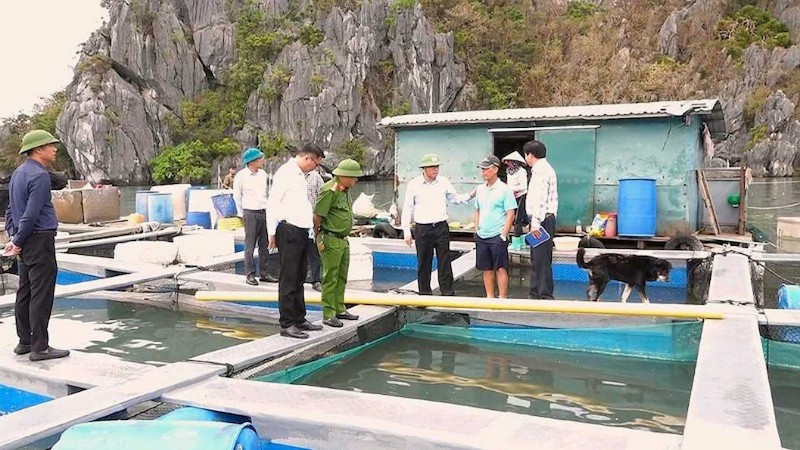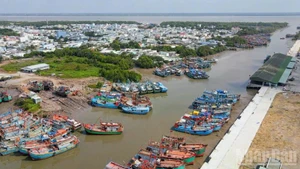To overcome these difficulties, along with support from the province and local authorities, aquaculture facilities in the province have quickly worked to repair the damage and restart their business operations.
Van Don District, which suffered the heaviest aquaculture losses from Typhoon Yagi, estimated total aquaculture production losses of around 32,000 tonnes at harvest time, along with tens of thousands of tonnes of newly stocked oysters and fish, with total damage estimated at over 2.2 trillion VND.
Pham Van Dong, a long-time cage fish farmer in Cai Rong Town, shared: “Typhoon Yagi swept away all my family’s years of hard work, leaving us with nothing. The damage is severe, but since we’re committed to living off the sea, we’re salvaging whatever floating cages and buoys we can find to reuse and restore our family’s farming operations.”
To promptly support aquaculture farmers after the storm, Van Don District recently allocated marine farming areas to Dong and four other farming households in the Hon Beo Co area, with 0.5 hectares per household.
Additionally, leaders of Quang Ninh Province and Van Don District have organised multiple meetings to discuss solutions for helping businesses, cooperatives and households restore aquaculture activities in Van Don District.
Along with implementing solutions to support fishermen in recovering production after Typhoon Yagi, the district is also actively accelerating the process of marine area allocation. According to the plan, the district will allocate marine areas to 85 cooperatives with over 1,000 aquaculture households in the area.
To date, Van Don District has received 850 applications from aquaculture facilities requesting damage support to restore production across a total area of over 2,892 hectares.
Following the Prime Minister’s directive, Agribank Van Don has reviewed 276 cases of loan customers affected by the storm with total outstanding loans of 304 billion VND and extended loan repayment periods for 123 cases totalling 99.901 billion VND, implemented loan interest reduction and 100% waiver of overdue interest and late payment interest from September 6 until the end of 2024 for 276 cases, totalling 507 million VND.
The Van Don branch of the Vietnam Bank for Social Policies has also reviewed 1,434 cases of borrower households affected by the storm with total outstanding loans of 103.3 billion VND and suspended interest collection for customers affected by Typhoon Yagi until December 31, 2024. They extended debt repayment for all customers with due payments and restructured debt for 168 cases, totalling 11.8 billion VND.
Other banks in Van Don District are also reviewing new loans for 22 cases, with total loans of 24 billion VND for business operations.
Van Don Vice Chairman Dao Van Vu said: “To date, the district has allocated over 6,000 hectares of marine areas to households seeking to rebuild production. District-wide, 50% of fish farming cages have been restored compared to before Typhoon Yagi.”
Not only in Van Don, many aquaculture facilities in other localities in the province, such as Cam Pha, Quang Yen, and Dam Ha, have also begun restoring production. Currently, about 30% of facilities in the province have started breeding oysters. In the coming time, the number of aquaculture facilities resuming production is expected to gradually increase if they can access preferential loans to rebuild after the storm.
Do Dinh Minh, Head of Quang Ninh’s Fisheries Sub-Department, said: “Currently, along with implementing central government policies on natural disaster damage support, the sub-department has advised the Department of Agriculture and Rural Development to report to the Provincial People’s Committee on building specific mechanisms not only to restore production but also to support people in rebuilding aquaculture production in the coming time.”
Aquaculture is a strength of Quang Ninh Province, and together with the efforts to revive production by aquaculture facilities after Typhoon Yagi, the province’s support through specific mechanisms and policies is a great motivation for people and businesses in aquaculture to quickly recover and stabilise production and business operations, contributing to ensuring social security and promoting the province’s continued economic growth in the coming time.
















